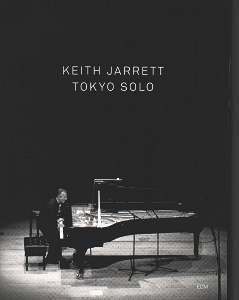DVD
review
1. Applause
2. Part 1a
3. Part 1b
4. Part 1c
5. Part 2a
6. Part 2b
7. Part 2c
8. Part 2d
9. Part 2e
10. Danny Boy
11. Ol’ Man River
12. Don’t Worry ‘bout Me
Keith Jarrett - Piano
Subtitled
"The 150th concert in Japan",
this DVD is a film of a solo piano recital
which Keith Jarrett gave in Tokyo in 2002.
It is disconcerting to see that the first
track is listed as "Applause 0.33",
as if someone is taking things rather seriously.
And indeed the setting looks serious, with
only a grand piano on a huge stage, plus a
small table at one side bearing a glass and
a bottle of Volvic water.
When
Jarrett starts playing, the music wanders
without finding much in the way of melody
or even rhythm – nearer Schoenberg than jazz.
Keith’s creased, agonised face suggests that
he is suffering for the creative process but
he doesn’t appear to be creating anything
very memorable, with clusters of notes tripping
over one another, apparently aimlessly. A
faster segment brings a bit more excitement
but nothing more cohesive.
Part
1b is a slow meditative piece making full
use of the piano’s sonorous qualities – rather
like a chorale, with some Debussyesque touches.
Part 1c starts with restless trills and swirling
sounds – lots of notes but what are they saying?
The intensity eventually calms down and even
develops into a lyrical exploration in the
piano’s upper register.
Most
of the segments in Part 2 are shorter, perhaps
heralding less self-indulgence, yet one still
feels that Jarrett is searching for a meaning
without always finding one. The process of
exploration can be exhilarating but eventually
it needs to lead somewhere – otherwise it
is in danger of becoming pleasant but inconsequential
doodling.
Part
2a is calm and thoughtful, and 2b consists
of nervous arpeggio-like runs up and down
the keyboard. As the music leaps from one
note to another, Jarrett half-stands, as if
he’s peering inside the piano to watch the
hammers doing their work (as in the cover
picture above). Part 2c is built from widely-spaced
single notes but the next part brings the
first sign of a rich rhapsodic melody, which
comes as a relief after the uncertainty of
Keith’s preceding explorations. In this part
he creates something which has the aura of
an ancient folk tune.
Part
2e reverts to those liquid trills which come
to be topped by a somewhat oriental improvisation
and then an almost funky groove over an ostinato
bass which ends abruptly. Up to this point,
Keith Jarrett has seldom scaled the heights
he reached in his early solo performances
at Cologne, Bremen and Lausanne in the 1970s.
They, too, were exploratory but Jarrett created
some remarkable music en route, while
the Tokyo concert leaves one wanting something
better formed.
In
a way, this is provided by the three encores,
where we are safely in the world of standards,
starting with a beautifully chorded Danny
Boy. Jerome Kern’s Ol’ Man River is
also slow and wistful before it develops into
one of Jarrett’s satisfyingly down-home improvisations
with earthy bass notes. The concert ends with
Rube Bloom’s Don’t Worry ‘bout Me –
another gentle interpretation of a show-tune.
Keith stays close to the tune, seemingly trying
out the effect of different chords beneath
the melody. These last three tracks are the
most satisfying on the disc – not simply because
they explore familiar territory but because,
to me at least, Jarrett achieves more musicality
here than in the rest of the recital.
Tony Augarde
